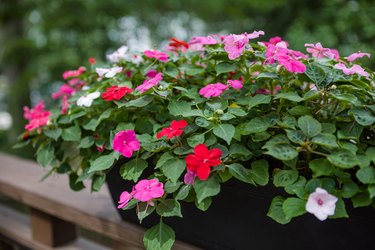
Seeing kitties timidly sniffing blossoms in your flower garden can create an "aw!" moment — maybe even a special photo opportunity — but sometimes, they start munching things that can hurt them. For felines and for those avid flower gardeners who care about the well-being of their pets, it is fortunately safe for cats to be around impatiens (Impatiens spp.). Other plants, however, are not so friendly, so check on the toxicity levels of your plantings because what you choose to grow can pose a serious threat to plant-nibbling kitties who are usually simply curious and bored — not hungry.
Tip
Although there are outdoor plants that can threaten the health and life of felines, impatiens are not one of them.
Video of the Day
Impatiens — Friendly, Popular, and Attractive
Harmless impatiens are popular among gardeners for several reasons: They're very easy to grow and care for (no deadheading); they're robust bloomers available in soft pastels and vibrant hues; and unlike so many plant favorites requiring partial to full sun, older impatiens varieties in particular can lend their color to fully shaded areas, where they thrive.
Video of the Day
There's no reason impatiens wouldn't be attractive to feline explorers. To humans, impatiens carry little fragrance, but your cat has a sense of smell 15 times more sensitive than yours. Plus, dangling and bobbling clusters of plump little buds on the plant are just the sort of thing in which playful kitties take delight. So, the lack of toxicity in this flower is a good thing.
Some Plants Can Kill
Some plants aren't so kitty-friendly, causing grave illness in felines — even quick fatality — and cats are often less likely than dogs to survive serious plant poisoning. Their body is smaller, they tend to hide themselves away when sick, and they lack enzymes that help process chemicals out of their systems. If you notice your cat nibbling around plants that you can't identify, monitor the animal closely for signs of distress. If you know the plant to be highly toxic, take your pet to the vet immediately. You may also call the American Society for the Prevention of Cruelty to Animals (ASPCA) poison control hotline at 888-426-4435.
Lilies are one of the worst enemies of a munching kitty. If any part of the plant is ingested — even just a bit of pollen — complete kidney failure can occur within two to three days. Treatment must begin within 24 hours. In addition to lilies, the ASPCA lists these plants as those most toxic to cats:
- Tulip and daffodil (especially the bulbs).
- Azalea and rhododendron.
- Castor bean.
- Yew.
- Autumn crocus.
- Chrysanthemum.
- English ivy.
The list of plants that can sicken felines is lengthy, but in addition to the ASPCA's list of the most serious threats, other plants to keep your cat away from include the sago palm, lily of the valley, oleander, cyclamen, kalanchoe, and oleander, which can be fatal.
Symptoms of Plant Poisoning
The first symptoms of plant poisoning to show are usually vomiting and diarrhea, but there may also be respiratory and neurological problems, liver and/or kidney failure, and skin issues. Watch for excessive drooling, increased heart rate, breathing difficulties, coughing, sneezing, jaundice, excitability, tremors, seizures, lack of coordination, paralysis, depression, an increase in drinking, and loss of appetite. The animal may even become comatose.
Landscape for Cat Safety
Taking care to plan your garden with cat visitors in mind secures their safety, removes the need for you to worry about what they're exploring, and helps prevent destruction of your lovely garden by curious kitties.
Visit the website of the ASPCA to see its extensive and comprehensive list of plants that are toxic to cats so you can check on anything you're planning to install. Also check on the safety of preexisting plants. If you can't identify something already growing, take photos to send to your local extension office or visit it with a sample.
In addition to keeping toxic plants out of your garden, consider excluding plants that have thorns. Also make sure you take your kitty's safety into consideration when it comes to storing and using various chemicals in your garden. If you use a compost bin, secure it so kitties are unable to make meals of what's inside.
- American Society for the Prevention of Cruelty to Animals: Poisonous Plants
- Britannica: Impatiens
- Purdue University: Turfgrass Disease Profiles: Powdery Mildew
- PennState Extension: Petscaping: Creating a Pet-Friendly Garden
- Hartz: Your Cat’s World: How Your Feline Uses His Senses
- Clemson Cooperative Extension Home & Garden Information Center: Impatiens
- Little Flower Hut: All About Impatiens – History, Meaning, Facts, Care & More
- American Society for the Prevention of Cruelty to Animals Pro: 17 Plants Poisonous to Pets
- International Cat Care: Cats and Poisons
- Texas A&M University Veterinary Medicine & Biomedical Sciences: Toxic Plants To Avoid at Home
- Cornell Cooperative Extension: Pet Safe Gardening
- University of California, Davis: 10 Garden Plants That Are Toxic To Pets
- University of Florida IFAS Extension: Plant Identification: Impatiens (Impatiens spp.)